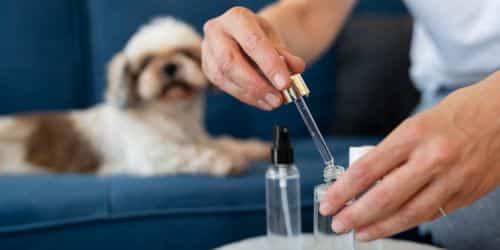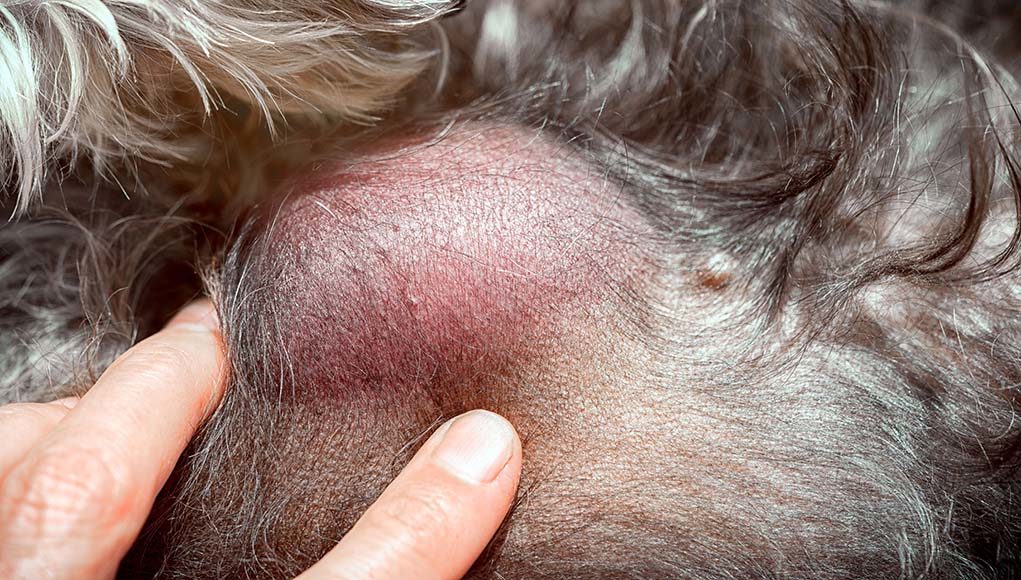Hydrogen peroxide is a moderate antiseptic that is commonly found in home medical cabinets. It is used to clean minor cuts, scratches, and burns and to prevent infection. Additionally, it is effective as a mouth rinse for gingivitis and cold sores. Many people feel it can be used to treat dog injuries because of its gentle characteristics. However, is hydrogen peroxide safe for dogs? Learn when you may and cannot use hydrogen peroxide on pets and whether there are any safe alternatives.
Is Hydrogen Peroxide Safe to Use on Dogs?
When your pet is injured, it is natural to feel overwhelmed and scared. Many people will instinctively reach for their personal first aid pack to provide care. However, it is critical to recognize that products designed for people are not necessarily safe and beneficial for dogs. It is not advised to use hydrogen peroxide to treat dog wounds.
Pouring hydrogen peroxide on a wound can be relaxing as you see the bubbles grow and hear it aggressively removing dirt and bacteria. While this path is normally preferred, it has significant drawbacks for pets. The natural healing mechanism of the body is slowed by hydrogen peroxide. Bacteria are killed by peroxide because it has an additional hydrogen molecule. However, as it destroys germs, it also kills fibroblasts. These cells are required for wound healing. Hydrogen peroxide can sometimes irritate tissue and cause more harm than good.
However, there are conflicting viewpoints on the subject. Furthermore, some veterinarians advise using peroxide only to clean minor cuts and scratches or diluting it with water. However, everyone is in agreement that professionals should take care of serious gashes and abrasions, including wound washing and disinfection.
Will Licking Hydrogen Peroxide Hurt a Dog?
People sometimes use 3% hydrogen peroxide to make their dogs vomit after ingesting dangerous chemicals. However, this treatment is usually performed under the supervision and instruction of a veterinarian. It’s advised not to let your dog lick or drink hydrogen peroxide because it can cause gastrointestinal irritation and ulcers. If you feel your dog has consumed hydrogen peroxide, contact your veterinarian.
When Is It Safe to Use Hydrogen Peroxide on Dogs?
Unless otherwise directed by a veterinarian, you should avoid using hydrogen peroxide on your dog. However, peroxide can still be useful in the house and when caring for a pet.
Clean the fur around your pet’s injury with hydrogen peroxide, taking care not to get it directly on the skin. Blood and drainage can stain fur, but peroxide is a good cleanser.
Peroxide can also be used to clean bloody or soiled cloth or dog collars. Hydrogen peroxide is a good stain remover.
To produce a homemade de-skunking solution, combine hydrogen peroxide, baking soda, and dish soap. Just avoid getting any in your pet’s eyes or other sensitive regions. This remedy will remove odorous skunk spray from your dog’s fur.
You may also use hydrogen peroxide to disinfect dog toys and other items that require a thorough cleaning.
Is it OK to Clean Your Dog’s Ears With Hydrogen Peroxide?
If your dog is prone to ear infections or appears to have a lot of wax buildup, you may be wondering if you can clean a dog’s ears with hydrogen peroxide. After all, peroxide solutions are included in over-the-counter ear drops for humans. Is it a safe approach to clean your dog’s ears? In a nutshell, experts disagree on whether hydrogen peroxide is safe and useful for your dog. This is why:
Some veterinarians believe hydrogen peroxide is safe for your dog’s ears.
Many veterinarians agree that hydrogen peroxide is safe for dogs, but only when used under medical supervision.
That is, unless your vet instructs you otherwise, if you suspect your dog has yeast buildup or another infection in their ear, you should not clean the inside of their ears with hydrogen peroxide.
For a dog with a slight infection, a solution of one part hydrogen peroxide and one part water can be used to wipe out the canals of the ear using a cotton ball, with veterinarian approval. Never use a Q-tip or a sharp tool to clean the ear.
Hydrogen peroxide can eliminate bacteria that cause ear infections, which may relieve your dog’s earache.
Other veterinarians believe it is not safe to use.
Other veterinarians are skeptical of using hydrogen peroxide to clean dog ears or cure ear infections. Because of how it works chemically, experts are apprehensive of utilizing it.
H2O2 is the chemical formula for hydrogen peroxide. It generates a bubbling sound when it enters the ear. This means it’s effective in killing any germs in your dog’s ear, good or bad. That extra oxygen molecule is expelled as it bubbles, leaving you with H2O, or water.
Water in a warm, wet area, such as your dog’s ear, is ideal for any resistant bacteria to not only survive but thrive. This can result in a more serious ear infection, causing ear damage and, in severe circumstances, hearing loss.
Can Hydrogen Peroxide Make a Dog Vomit?
The recommended approach for making a dog vomit is a 3-percent solution of hydrogen peroxide. Fortunately, it’s also rather common in our home medicine cupboard. In case of an emergency away from home, keep a bottle of hydrogen peroxide in your travel dog first aid kit.
When owners are unable to get their dogs to a veterinary hospital promptly, they might use hydrogen peroxide as an emetic to make them vomit. Hydrogen peroxide is an irritant to a dog’s intestinal tract and normally acts within 10-15 minutes, causing your dog to vomit approximately 50% of their stomach contents. Because vomiting might persist up to 45 minutes, feed your dog hydrogen peroxide to induce vomiting in an area where he will be as comfortable as possible throwing up. Avoid their usual sleeping, crate, or feeding spots; instead, try a bathroom or laundry room where you can offer them with a peaceful, out-of-the-way location that is also readily cleaned.
When provided by a veterinarian, hydrogen peroxide is generally regarded as safe for inducing vomiting in dogs. However, you do not have the luxury of veterinarian competence at home. If your dog exhibits any of the following signs or conditions, do not force them to vomit:
- Already puking
- Extremely sluggish
- Comatose
- Reduced swallowing ability
- Having trouble breathing
- Seizures or excessive activity
- Recent abdominal surgery or megaesophagus (generalized esophageal expansion)
- Corrosive substances, sharp objects, or medications were consumed.
Alternatives To Hydrogen Peroxide
Cleaning wounds or your dog’s skin in general is an important step in maintaining your dog’s health and wellness. However, you should use caution when using items. Avoid using hydrogen peroxide, rubbing alcohol, soaps, shampoos, essential oils, or any other products that have not been expressly prescribed by your veterinarian. Some materials are poisonous, impede healing, and cause skin irritations such as rashes.
To keep your dog safe, flush the wound with warm tap water. Alternatively, make a warm saline solution by combining one teaspoon of salt and two glasses of water. After carefully bathing with water or saline, make sure there is no dirt or debris on the wound or surrounding fur, and pat the area dry. To eliminate and prevent the growth of hazardous bacteria, you can also use an antimicrobial surgical soap, such as chlorhexidine. Chlorhexidine, on the other hand, should not be used on clean, healing wounds. Although it is typically safe to use on skin and other bodily surfaces, you should consult your veterinarian before using it on your dog or other pets.
After cleaning and drying the wound, apply a tiny amount of antibiotic ointment and wrap it with a clean bandage. This straightforward approach is intended for minor cuts and scratches. Take your dog to the emergency vet right away for major injuries and allow them to sterilize the laceration.
What Happens If A Dog Licks Hydrogen Peroxide?
In dogs, consuming 3% hydrogen peroxide might cause modest adverse effects, although serious reactions can occur. Following hydrogen peroxide administration, severe gastritis (stomach inflammation) can ensue, leading to stomach ulcers, bleeding, and even death in severe cases.
How Much Hydrogen Peroxide Is Safe For Dogs?
Higher hydrogen peroxide concentrations are hazardous and can cause catastrophic damage. Administer the appropriate amount of hydrogen peroxide: one teaspoon per five pounds of body weight by mouth, with a maximum dose of three tablespoons for dogs weighing more than 45 pounds.
How Does Hydrogen Peroxide Help a Dog?
To induce vomiting in dogs, a 3% solution of hydrogen peroxide can be administered. Many people’s homes contain hydrogen peroxide. Consult your veterinarian before administering peroxide to your pet to determine the proper dosage. Within 10-15 minutes of ingestion, hydrogen peroxide affects the digestive system.
What is a Safe Antiseptic For Dogs?
Chlorhexidine is a topical antiseptic solution that is applied to the skin of a dog. It inhibits bacterial and fungal growth, which can lead to skin diseases in dogs. One of the most popular types is chlorhexidine gluconate. Chlorhexidine usually appears as a dark blue solution.
How Long Does Hydrogen Peroxide Last In a Dog?
The digestive tract is irritated by hydrogen peroxide, which is generally effective after 10-15 minutes of consuming it and can recover up to 50% of the previously digested food. Vomiting can take up to 45 minutes, so make sure your dog is in a comfortable environment.
What Happens If A Dog Does Not Throw Up Hydrogen Peroxide?
The majority of dogs vomit within one hour of ingesting hydrogen peroxide. However, if a dog does not vomit after being given H2O2, pet owners must immediately contact an emergency veterinary hospital. Remember that these risky at-home therapies might cause aspiration pneumonia, which can be fatal.
In Conclusion,
It can be difficult to decide whether or not to use hydrogen peroxide to clean out your dog’s ears because there are some benefits, but there are also some risks.
Working together with your doctor to create a treatment particularly for your pup is the best method to pick the course of action for any medical treatment of your dog. There are numerous more items available to clean your dog’s ears. You should discuss this with your veterinarian.
Related Articles
- Top Non-Prescription Flea Medicines for Dogs: Your Guide to Effective Solutions
- Understanding Canine Developmental Disorders: Conditions in Dogs Resembling Down Syndrome
- Bladder Cancer In Dogs: Causes, Symptoms, and Treatment
- Is Hydrocortisone Safe For Dogs? Everything You Should Know






